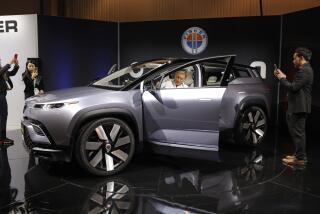Autobytel reviving its marketing sites after a rocky recession
It’s been a wild ride for Autobytel Inc., the online automobile marketing company launched in Orange County during the Internet’s gold rush.
Founded in 1995 by Southern California car dealership owner Pete Ellis, the company promised to take the hassle out of car-buying by enabling consumers to connect online with dealers, which would pay for Autobytel’s sales leads.
The company introduced itself to the world in grand style — a $2.5-million television commercial during the 1997 Super Bowl with Leonard Nimoy handling the voice-over. Autobytel was the first Internet company to advertise during the Super Bowl.
“From the beginning of time, people wondered, ‘Why does car buying have to be such a pain?’” Nimoy said.
It wasn’t long before Autobytel executives were wondering why running an auto marketing website was such a pain. The company didn’t turn a profit until 2003, and barely five years later was hammered by the Great Recession. Autobytel shares fell to 38 cents in 2008 — a 99% drop from its $52.75 opening price nine years earlier.
The company was about as attractive as a Ford Pinto.
In December 2008, Autobytel’s board hired former General Electric Co. executive Jeffrey H. Coats as its new chief executive. Ellis had left the company a decade earlier.
Coats, a longtime Autobytel director, reduced expenses by slashing staff. He switched the company’s focus to its roots: developing most of its sales leads on its own, instead of paying third parties for them.
Under Coats, the Irvine company closed unproductive websites and focused on its two best-known brands, autobytel.com and car.com.
Today, Autobytel sells leads to more than 3,600 U.S. auto dealerships — usually for $20 a pop, regardless of whether the lead results in a sale.
The company reported $66.8 million in revenue last year. It earned $1.4 million.
It’s spending on advertising again. Could the Super Bowl be next?
“I would never say never,” Coats said. “We definitely are back. We’d like to get the story out there.”
The latest
Autobytel’s second-quarter results were the best in five years, and it beat expectations for revenue and profit.
The company reported $17.8 million in revenue for the second quarter, up 13% from $15.7 million in the same period last year. It earned $386,000, up 67% from $231,000 a year earlier.
Car dealerships are willing to pay for Autobytel’s sales leads because they are an extremely effective way of producing sales, Coats said. He said the company’s close rate — the proportion of leads that produce sales — is an industry best.
“We’ve gotten our lead quality up to very high close rates. That’s what’s driven our revenue. That’s what’s driven us to profitability,” Coats said.
Accomplishments
After posting losses every year from 2005 to 2010, the company turned a profit in each of the last two years and is forecasting a solid year for 2013.
“Today, we generate 70% of our leads internally and we have one of the highest close rates in the automotive industry,” Coats said. “A lot of our customers tell us our leads close at the highest rate of anyone they buy leads from.”
The company’s has reduced expenses and increased revenue. Investors have noticed.
The stock reached a 52-week high of $6.39 on Tuesday. It closed Friday at $6.11 and is up 54% so far this year.
Challenges
Autobytel’s fortunes are tied to the volatile automobile industry.
It once believed that it was immune to downturns because dealers might be more willing to pay for leads when business was slow.
But the company suffered during the recession — there simply weren’t as many leads to sell because consumers weren’t buying.
Analyst views
All five analysts who cover Autobytel recommend buying its stock. They estimated, on average, that the stock will be selling for $7 a share a year from now.
George Santana, an analyst with Ascendiant Capital Markets, raised his 2013 estimated earnings for the company Aug. 2 after “another great quarter.” He rates the company’s stock as a “strong buy” and said he expects shares to be trading at $7 to $7.50 within a year.







